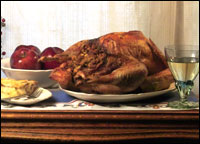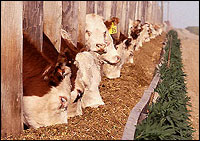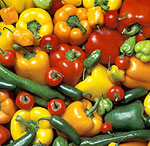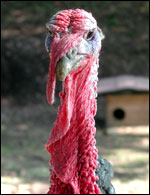Sharpen your knives and hone your appetite — it’s that time of year again. Every fall, we stuff ourselves at Thanksgiving, take a quick break, then fill up again over the winter holidays, sometimes gorging at event after event to accommodate multiple sets of family and friends. But environmentalists, beware: The industry set up to sate this orgy of consumption is none too kind to animals or the environment.

Eat, drink, and be green.
Take that staple of Thanksgiving dinner, the turkey. We’ve bred turkeys for superior breast meat for so long that they now literally have trouble standing upright, resulting in birds with lame, infected legs and hips that can barely walk, let alone fly. Because these over-bred turkeys aren’t genetically diverse, they are vulnerable to disease and can only reproduce via artificial insemination. They’re pumped full of antibiotics and fed not nuts, grains, and grass — their normal diet — but high-protein food, including slaughterhouse leftovers. Then they are stuffed into crates, taken to the slaughterhouse, and electrically stunned, often ineffectively. They die when their throats are cut, and are sold as that Butterball you buy for a few cents a pound.
Or what about the time-honored tradition of the Christmas ham? Even Animal Farm sounds bucolic compared to the truly Stalinist conditions of the CAFOs, or “concentrated animal feeding operations,” where Christmas-dinners-to-be spend their lives being treated as protein on the hoof. With as many as 10,000 pigs per facility, each CAFO can produce as much waste as a town of 25,000 people. The waste is captured in ponds where heavy rainfalls, flooding, and poor sealing can result in overflows that poison local water tables.

We’ve got a beef with feedlots.
Photo: USDA.
If beef is on your holiday menu, consider this: Feedlots crowd cattle ankle-deep in manure and urine, providing ideal conditions for the spread of pathogens like salmonella, listeria, and E. coli. Last year alone saw the nation’s second-largest beef recall and third-largest poultry recall. Yet the industry’s solution — combating illness through antibiotic-laced feed — promotes dangerously disease-resistant strains of bacteria.
As for vegetables and fruits, pesticide spraying on conventional crops can lead to contamination of waterways, while fertilizers are infamous for causing algae blooms, which can strangle lakes and other bodies of water. And then there are the human-health impacts, which are particularly acute for young people: In January 2003, the U.S. Centers for Disease Control reported that U.S. children had up to twice the levels of many pesticides in their bodies as adults did. (In more heartening news, a University of Washington study published last March showed that children fed organic diets had one-sixth the level of metabolized organophosphate pesticides as those fed conventional foods.)
Wait, Don’t Despair — Here’s the Good News
Happily, there are plenty of eco-friendly choices available for the conscientious holiday host. Vegetarianism is on the rise, and an increasing number of cookbooks, magazines, and websites offer suggestions for meat-free holiday menus. Dedicated carnivores can purchase meat raised and slaughtered in ways that minimize health threats, harm to the environment, and the suffering of the animal.
To avoid fouling up your holiday meal — whether it’s made from bird, beast, or bean — consider these tips:
Know when it matters to buy organic. Holidays are expensive as it is, and unfortunately, healthy choices for you and the environment can strain your wallet. Still, while organic food can be costly, our survey of New York markets (including Whole Foods, Fairway, and Food Emporium) showed that with some items, such as sweet potatoes and brown rice, prices for organic and conventional foods are about the same. (See our comparison charts, below.)

Pick a peck of organic peppers.
Photo: USDA.
If you want to reduce your exposures to pesticides and other toxins while keeping an eye on your budget, you can prioritize intelligently by avoiding conventional varieties of the 10 most contaminated fruits and vegetables: peaches, apples, strawberries, nectarines, pears, spinach, bell peppers, celery, potatoes, and hot peppers. Less-contaminated conventional foods include blueberries, plums, avocados, radishes, and broccoli.
Local can be better than organic. Organic agriculture is increasingly big business, and many large organic farms resemble industrial farms in significant ways. For example, they may manufacture standardized products in large quantities and ship them over long distances, at the expense of fossil fuels — and freshness.
Many small farms are essentially organic, but don’t always get certified and therefore can’t label themselves as such. Buying locally from such a farm, or from a greenmarket or specialty food store you trust, is often the best choice. Doing so supports small-scale agriculture, encourages biodiversity over standardization, and cuts down on the fossil fuels used in shipping food across the country. Plus, it gives you a chance to seek out homegrown delicacies, such as native wild rice in Minnesota, Wisconsin, or Canada, chili peppers in New Mexico, or artisanal sheep cheeses in Vermont.
Cruelty-free is key. A Minnesota turkey farm manager was recently caught on videotape bludgeoning birds with a stick and pliers and wringing their necks. Research the source of your fish, foul, and meat before plunking down your money.

Gobble gobble.
Talk turkey. If you are leaning toward serving turkey at a holiday meal, try to visit or call some local small farms and inquire about their methods. Make sure healthy, non-genetically-engineered animals are raised and slaughtered in humane and safe ways. If you can’t get out to the farm (we know holiday times are busy enough as it is!), look for the American Humane Society’s Free Farmed label. This label indicates that animals were raised free from unnecessary fear, distress, pain, injury, and disease, given ready access to water and a proper diet, and housed in a species-appropriate environment.
Better still, find a local supplier you trust. LocalHarvest can help you find an organic turkey farm near you. If necessary, you can buy organic turkeys on the web; Diamond Organics sells nationwide and delivers overnight. And Slow Food USA runs a Heritage Turkey program that breeds heirloom turkeys — traditional breeds that are near extinction — on a small scale and sells them locally through a nationwide network of farms. Starting this year, all their turkeys are raised on organic feed. They get more exercise and have a more varied diet than industrial turkeys — and they can actually fly. They also taste better and are less dry, as they are allowed more months of life, allowing them to develop a layer of fat that commercial turkeys lack. Heritage Turkey farms need advance notice, though, so order soon; sustainable agriculture can’t manufacture animals on demand.
A Critter-Friendly Reading List
There are many prominent writers on animal rights, all well worth checking out. Peter Singer has been the preeminent philosopher of animal rights ever since the publication of his 1975 book Animal Liberation. This year’s Nobel Prize winner in literature, J.M. Coetzee, has written philosophical fictions about the lives of animals, including his latest, Elizabeth Costello. Michael Pollan, in a number of eloquent articles written for the New York Times Magazine and elsewhere, has given perhaps the most practical and wide-ranging advice on ethical eating, for the convert and for the agnostic, for the whole year and also for Thanksgiving. See his New York Times Magazine article “Power Steer” for more on the U.S. beef industry.
What Price Organic?
Produce
| Organic | Conventional | |
|---|---|---|
| Sweet potatoes | $1.49/lb | $1.49/lb |
| Russet potatoes | $0.40/lb | $0.49/lb |
| Yukon gold potatoes | $1.29/lb | $1.29/lb |
| Mixed salad bag | $3.69/bag | $2.99/bag |
| Broccoli | $2.99/lb | $1.99/lb |
| Tomatoes | $3.89/lb | $1.99/lb |
| Green zucchini | $3.89/lb | $1.49/lb |
| Spinach | $2.89/lb | $1.29/lb |
| Celery | $2.69/lb | $1.99/lb |
| Red onions | $1.19/lb | $0.99/lb |
| Baby carrots | $2.29/bag | $1.49/bag |
| Butternut squash | $1.49/lb | $0.99/lb |
| Acorn squash | $1.49/lb | $0.99/lb |
| Cranberries | $5.00/lb | $2.65/lb |
| McIntosh apples | $2.49/lb | $0.99/lb |
Meat and Meatless Meals
| Organic | Conventional | |
|---|---|---|
| Whole turkey | $4.95/lb (Organic Valley) | $0.99/lb |
| Ham | $18.99/lb (Organic Valley) | $3.99/lb (Sahlen’s) |
| Beef (top round) | $4.83/lb (Homestead Healthy Foods) | $5.99/lb (Coleman’s) |
| Tofu roast | $22.49/3 lbs 4 oz. (Tofurkey Vegetarian Feast) |
Grains, Sides, and More
| Organic | Conventional | |
|---|---|---|
| Brown rice | $2.58/2 lb (Whole Foods bulk) | $2.19/2 lb (Uncle Ben’s) |
| Rotelle pasta | $1.33/lb (Eddie’s Organic) | $0.99/lb (Ronzoni) |
| Wheat bread | $3.69/24 oz. (Baldwin Hill) | $2.79/24 oz. (Arnold’s) |
| Cheddar cheese | $8.78/lb (Horizon) | $3.69/lb (Wisconsin) |
| Turkey stuffing mix | $6.78/lb (Elizabeth’s) | $2.33/lb (Pepperidge Farm) |
| Salad dressing | $4.98/16 oz. (Annie’s Natural Organic) | $0.99/16 oz. (Wishbone) |
| Cranberry sauce | $2.69/lb (Heritage Foods) | $0.99/lb (Ocean Spray) |
| Turkey gravy | $1.90/16 oz. | $2.39/16 oz. (Pacific Foods) |
| Butter | $3.39/8 oz. (Organic Valley) | $2.00/8 oz. (Hotel Bar) |
Beverages
| Organic | Conventional | |
|---|---|---|
| Cranberry Juice | $3.69/32 oz. (Santa Cruz) | $2.19/32 oz. (Apple & Eve) |
| Apple Juice | $3.99/64 oz. (After the Fall) | $2.99/64 oz. (Mott’s) |
| Milk (2%) | $2.99/.5 gal (Naturally by Nature) | $1.49/.5 gal (Tuscan) |


